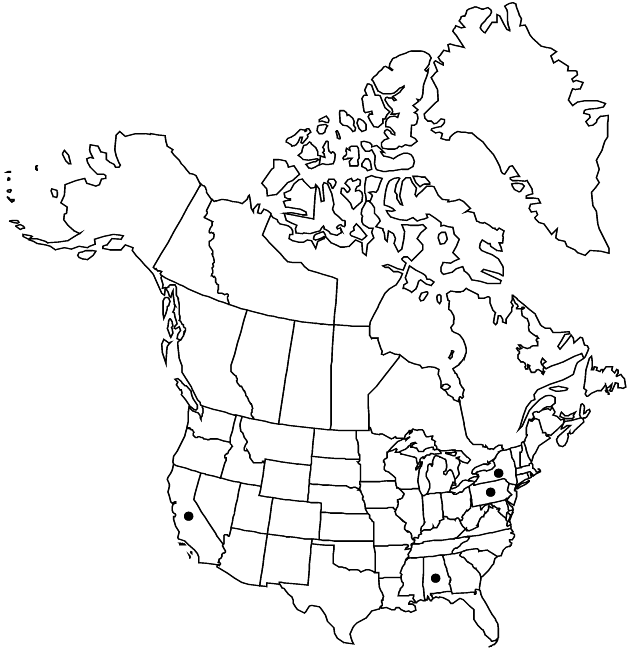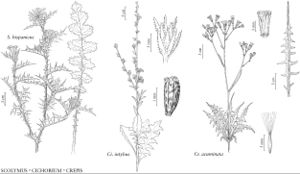Difference between revisions of "Scolymus hispanicus"
Sp. Pl. 2: 813. 1753.
Common names: Golden thistle Spanish salsify or oyster
WeedyIntroducedIllustrated
Treatment appears in FNA Volume 19. Treatment on page 220.
FNA>Volume Importer |
imported>Volume Importer |
||
| (6 intermediate revisions by 2 users not shown) | |||
| Line 8: | Line 8: | ||
}} | }} | ||
|common_names=Golden thistle;Spanish salsify or oyster | |common_names=Golden thistle;Spanish salsify or oyster | ||
| + | |special_status={{Treatment/ID/Special_status | ||
| + | |code=W | ||
| + | |label=Weedy | ||
| + | }}{{Treatment/ID/Special_status | ||
| + | |code=I | ||
| + | |label=Introduced | ||
| + | }}{{Treatment/ID/Special_status | ||
| + | |code=F | ||
| + | |label=Illustrated | ||
| + | }} | ||
|basionyms= | |basionyms= | ||
|synonyms= | |synonyms= | ||
| Line 24: | Line 34: | ||
|elevation=0–100 m | |elevation=0–100 m | ||
|distribution=Ala.;Calif.;N.Y.;Pa.;Europe. | |distribution=Ala.;Calif.;N.Y.;Pa.;Europe. | ||
| − | |discussion=<p>In the Mediterranean region, Scolymus hispanicus is used (or has been used) as a medicinal herb and root vegetable. It is considered to be a noxious weed in the United States.</p> | + | |introduced=true |
| + | |discussion=<p>In the Mediterranean region, <i>Scolymus hispanicus</i> is used (or has been used) as a medicinal herb and root vegetable. It is considered to be a noxious weed in the United States.</p> | ||
|tables= | |tables= | ||
|references= | |references= | ||
| Line 33: | Line 44: | ||
-->{{#Taxon: | -->{{#Taxon: | ||
name=Scolymus hispanicus | name=Scolymus hispanicus | ||
| − | |||
|authority=Linnaeus | |authority=Linnaeus | ||
|rank=species | |rank=species | ||
| Line 48: | Line 58: | ||
|publication title=Sp. Pl. | |publication title=Sp. Pl. | ||
|publication year=1753 | |publication year=1753 | ||
| − | |special status= | + | |special status=Weedy;Introduced;Illustrated |
| − | |source xml=https:// | + | |source xml=https://bitbucket.org/aafc-mbb/fna-data-curation/src/2e0870ddd59836b60bcf96646a41e87ea5a5943a/coarse_grained_fna_xml/V19-20-21/V19_271.xml |
|tribe=Asteraceae tribe Cichorieae | |tribe=Asteraceae tribe Cichorieae | ||
|genus=Scolymus | |genus=Scolymus | ||
Latest revision as of 19:50, 5 November 2020
Biennials or perennials. Stem wings not continuous, margins spinose, little, if at all, white or thickened. Leaf blades 40–200 × 15–70 mm, margins little, if at all white or thickened. Involucres 15–20 × 8–10 mm, larger in fruit. Phyllaries lanceolate, glabrous. Cypsela/palea units ± orbiculate to ovate, 3–5 mm; pappi of 2–4 setiform-aristate scales plus 0–4 muticous to lanceolate scales. 2n = 20.
Phenology: Flowering Jul.
Habitat: Disturbed sites
Elevation: 0–100 m
Distribution

Introduced; Ala., Calif., N.Y., Pa., Europe.
Discussion
In the Mediterranean region, Scolymus hispanicus is used (or has been used) as a medicinal herb and root vegetable. It is considered to be a noxious weed in the United States.
Selected References
None.
Lower Taxa
None.
